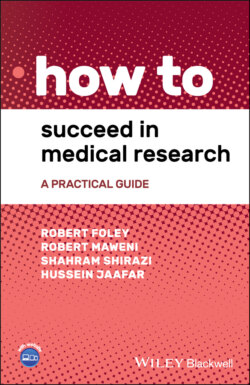Читать книгу How to Succeed in Medical Research - Robert Foley Andrew - Страница 8
Chapter 1 How to get involved in research 1.1 Why do research?
ОглавлениеResearch involves logical and systematic investigation of a topic in order to reach new conclusions and to gain greater understanding. Research also fundamentally involves the recording of one's findings and the dissemination of the results to others, allowing for the research to be replicated. At its core, research is about finding the answer to meaningful questions. Research represents the backbone of progress within medicine. Becoming involved in research as a medical student, junior doctor, or healthcare professional is an incredibly valuable and rewarding tool to have in one's arsenal. The benefits offered by performing quality research are many; for example, research
Demonstrates your interest in a topic.
Allows you to build up your own knowledge base.
Offers a stimulating reason to learn more about a topic.
Can often keep you interested in your work.
Allows you to become a better, more well‐informed healthcare provider.
May lead to improvements in your ability to provide patient care.
Provides a great chance to improve your CV.
This book aims to offer a how to guide to starting your research career, whether you have any experience with research or not. Research involves time and effort. It is not always easy to start, continue, or to finish a project. However, if you are dedicated and invest your time wisely, you can succeed in medical research.
The goal of getting involved in research can be many of the above outlined benefits, but the main goal should be to gain experience in research, develop skills that will help you throughout your career, and decide how much of a research interest to pursue over the course of your career.
Figure 1.1 The hierarchy of evidence.
